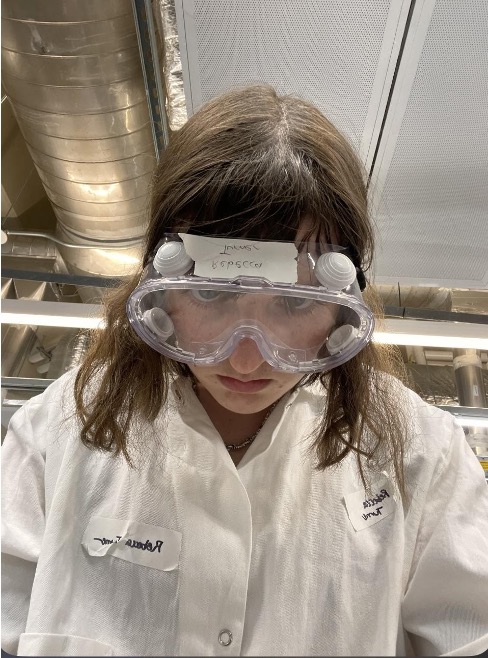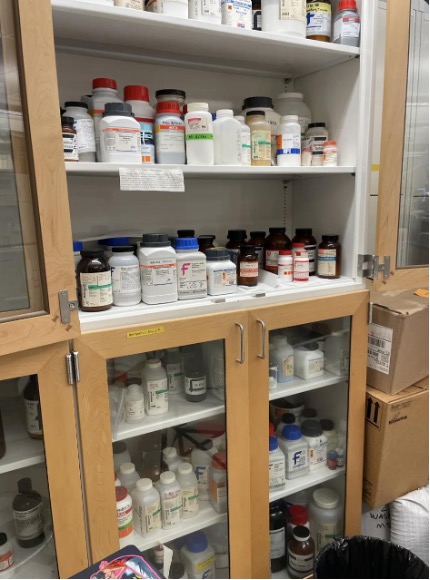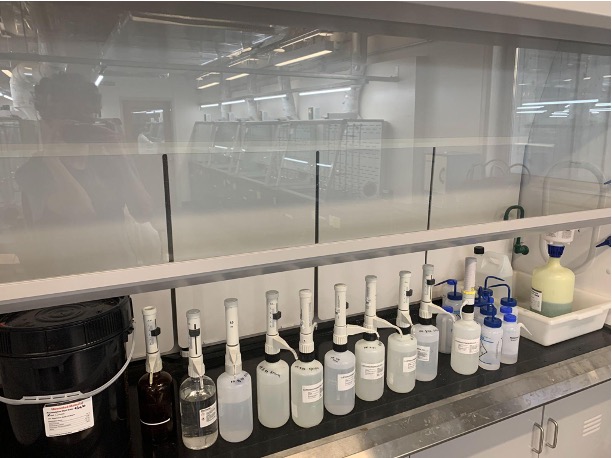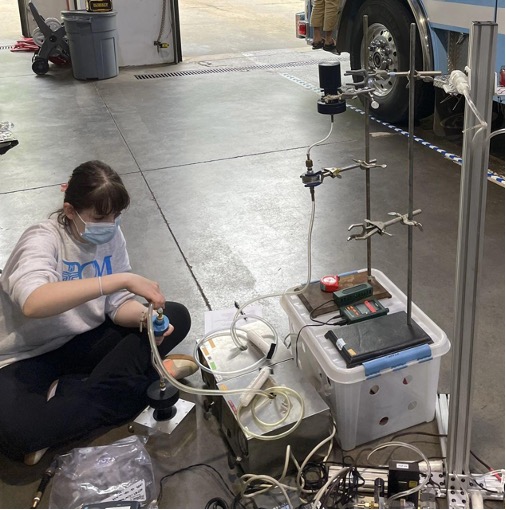How to Survive a UNC Chem Lab
By Rebecca Turner, a Peer Tutor
Morehead Labs. Vernier software. Safety goggles. Carbon-copy lab notebook.
If you’re anything like me (and the many other biology, chemistry, neuroscience, etc. majors), these words fill you with dread, as they are associated with UNC’s many chem lab courses. We suffer through these courses that are academically challenging, physically exhausting, and demoralizing, all to receive one measly credit hour.
However, just because we must suffer through them doesn’t mean we can’t at least suffer well. Coming from personal experience (having taken analytical lab and organic lab), I can say that it doesn’t have to be all doom and gloom, and signing yourself up for a course with the letter “L” at the end of its number doesn’t automatically mean a miserable semester. You can, and you will, persevere, and hopefully, this blog can help you along the way.
 How I see Morehead Labs (scary!)
How I see Morehead Labs (scary!)- Wear comfy clothes to lab: This might seem like a no-brainer, but you want to be as comfortable as possible during these labs as they last up to 3 hours. That means you might want to save your cutest fall outfit for the next day and opt for the sweatpants, or if it’s the middle of August and 90 degrees outside, the linen pants. (If you don’t own a pair of linen pants, I would HIGHLY recommend them anyway, especially if you see yourself working in a lab in the future. It will make your life so much easier in the summer if you don’t have to bring an extra pair of pants with you everywhere you go.) Also, wear shoes that you feel comfortable standing in for up to 3 hours. While a heeled ankle boot might seem like the most stylish option, you’ll hate yourself an hour in when you can’t feel your toes. Also, almost spilling ethyl acetate all over your brand-new Doc Martens is an experience you do not want. Save your toes (and your boots) and stick to the tennis shoes.
- Always carry an extra pair of long socks with you: The TAs WILL notice if your ankles are showing and will force you to cover them up. Whether this tip means leaving a pair of socks in your lab drawer (which would work… assuming you don’t re-wear them every single week) OR sticking a pair in your bag for that one day you forget. You’ll be glad when you don’t have to meet your roommate in the bottom of Lenoir an hour before lab, and they hand you your knee-high Halloween socks because you told them “any pair will do.”
 Don’t forget proper PPE!
Don’t forget proper PPE!
- Show up early… like at least 15 minutes early: I know this might sound crazy to some people, especially if you’re the chronically late type, but showing up early will save you from being frazzled when suddenly you have to write 10 pages of lecture notes, or you realize you did a calculation wrong on your pre-lab, or you can’t find your calculator/pen and have to dig through your backpack to find it. Granted, this could just be a me-problem because I like to get to places ridiculously early in case something goes wrong, but after my first ever Chem lab where I had no idea what I was doing and I got there right before class started and was stressed the whole time… I learned that if I gave myself a little extra time I would be cool as a cucumber. Chem labs can be stressful sometimes because you’re working with scary chemicals and the TAs will rush you, so you want to start off on the right foot at least.
- Become friends (or at least friendly with your lab partner): You will spend at least 3 hours a week working with this person and probably more time corresponding outside of class about your data, so you want to be on good terms. Trust me, if you and your lab partner can crack jokes and laugh even when things go horribly wrong and your data looks like garbage, it’ll make the lab period much more enjoyable, and less awkward when you actually can talk to each other instead of twiddling your thumbs waiting for your reaction to complete. They don’t need to be your best friend, and you may never see them again when the semester is over, but you have to be able to get along… otherwise, you will not survive.
Now, those are the tips the day of, but what about the assignments that take hours and hours and HOURS after the fact? These assignments are definitely more exhausting than lab itself (at least for some classes, looking at you, 241L) and the outcomes can be… a bit demoralizing to say the least. Fortunately, I have some tips that can save your sanity (and your grade).
- Read, re-read, and re-re-read the rubric just in case: For some labs, the rubric is OVERLY clear about what is expected of you, and it is a LOT. For others, the rubric is less clear, but there is still a lot expected. So, when you’re working on your lab report (or other assignments, but most often it’s a lab report), read the whole rubric, then each section when you work on it, and just keep constantly checking the rubric. It’ll be really tedious and will take you a while, but it gives you the best chance of getting a good grade.

- Don’t wait until the last minute to start your 10-page lab report: I know this is something everyone tells you, but I mean it. You’ll probably still be working on it the night before, but hopefully doing different chunks at a time will help you only have to stay up until midnight, and not have to pull an all-nighter. I would typically break it up into a section a day, and add it to my to-do list (cause I love making lists). One day, I might make my graphs. The next day, I might write out the calculations and citations. Then I might give myself two days to write out a discussion section. Start your lab report at least the weekend before it’s due, which is obviously not a fun way to spend your weekend, but at least you don’t have to do the whole thing at once in one night.
- Don’t be afraid to ask for an extension once, but don’t rely on it: Something I was terrified to do was ask for an extension. I automatically assumed the worst and that they would never give it to me. Meanwhile, my roommate asked for an extension several times and always got it. Basically, don’t assume your TA is heartless and would never be on your side. If you have a crazy week going on with 3 midterms, or you’re feeling under the weather and having trouble focusing on the assignment, go ahead and send that email. Granted, don’t wait until the night before to do it because you might not be as lucky, but the TAs will be understanding if you’re having a bad week and just need a little extra time.

- GO TO OFFICE HOURS: Seriously. Especially when the rubric is not OVERLY clear, office hours will be your best friend. You don’t even have to go to your own TA (although if you like your TA, I would recommend it because they know you and your situation better). Pick one of those times, and put it on your calendar. Now, don’t think you can waltz in there and ask the TA to read your entire lab report because 1.) I’m not sure they’re allowed to do that and 2.) There are probably 10-15 other people there if it’s crunch time who need help with something, too (on a side note, listen to other people’s questions: sometimes they’ll ask about something you wouldn’t have even thought about asking otherwise.) But, if you’re struggling with a specific problem and want feedback without a bad grade attached, you can ask them about it. Office hours saved my orgo lab grade, TRUST me.


